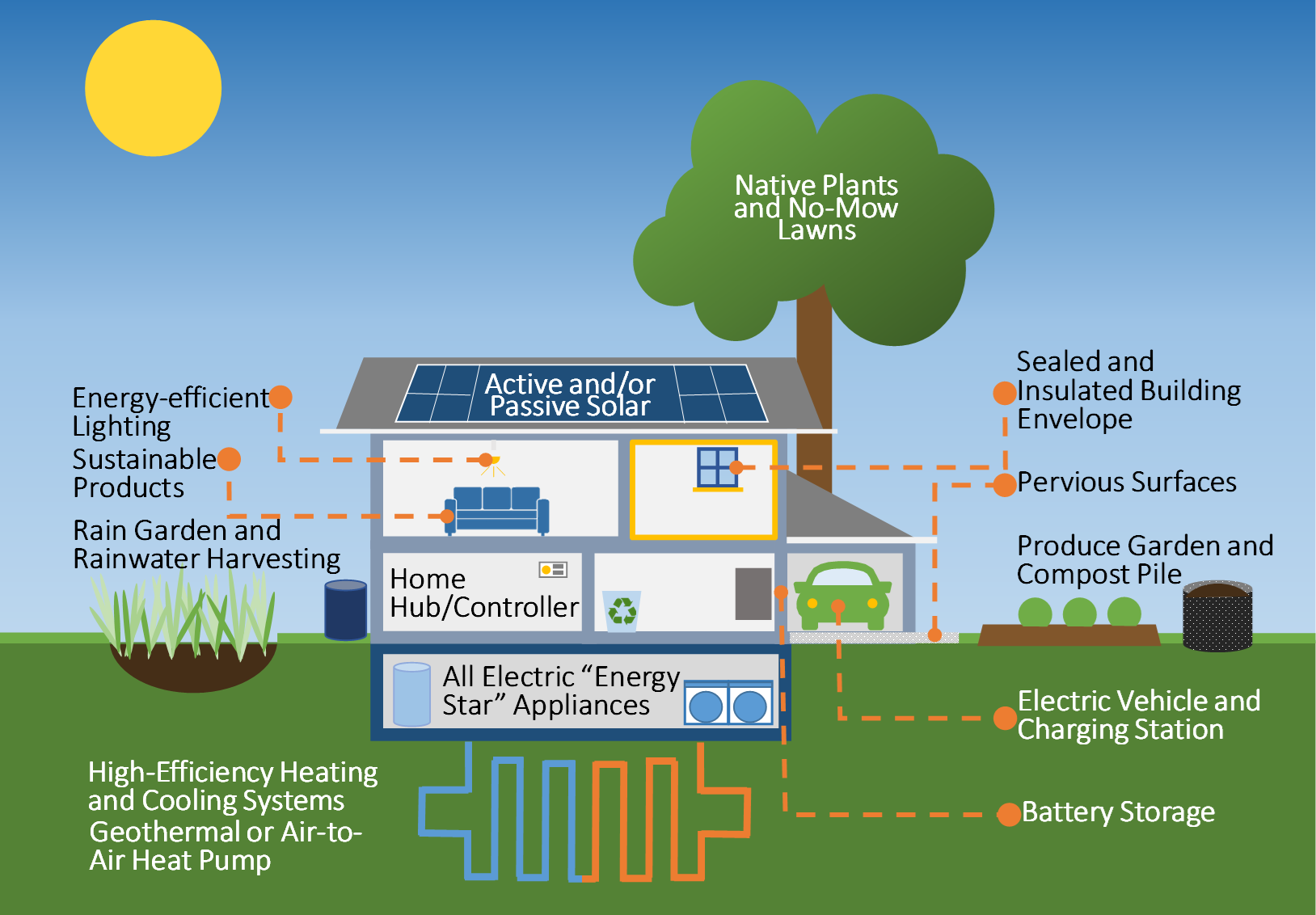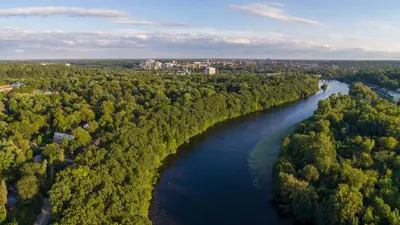Welcome!
For home electrification information, please visit our Home Electrification page.
Whether you live alone or in a shared house, in a single family home or in a multi-unit complex, own or rent, this page provides information about bringing energy - and water - efficiency into your home.
Efficient homes are not only better for the planet, but offer the opportunity for great cost savings and health improvements. On this page, you can learn more about:
- The new A2ZERO Home Energy Advisor
- How to save money though energy efficiency
- How to reduce your water bills through water efficiency improvements
- A2ZERO Green Rental Housing Initiative
- A2ZERO Home Energy Rating Disclosure (HERD) Ordinance
- Aging in Place Efficiently
- Tree Planting

A2ZERO Home Energy Advisor
Want to do more around your home, but don't know where to start? The A2ZERO Home Energy Advisor (HEA) may be just what you're looking for! The HEA is a free service open to all Ann Arbor residents, homeowners and renters alike. It provides free home energy assessments, answers to your questions, custom home decarbonization plans, contractor connections, identification of rebates and incentives, and project coaching.
Energy Efficiency
Improving the energy efficiency of your home can bring substantial benefits. Sealing your home can improve comfort by eliminating drafts in the winter and mugginess in the summer. Energy efficiency upgrades can also improve the resale value of your home, while saving you money on your energy bills. Finally, lowering your energy usage reduces greenhouse gas emissions and can improve indoor air quality, comfort, health, and safety.
How to Save Energy and Money
There are many options for improving the energy efficiency of your home. We have compiled a list of the top 5 ways to save money and energy:
- Find and seal air leaks
Air leakages into and out of your home can account for 30% of a home's heating and cooling costs; that's a lot of wasted money. According to ENERGY STAR, sealing and insulating the “envelope" or “shell" of your home – its outer walls, ceiling, windows, doors, and floors – is often the most cost-effective way to improve energy efficiency and comfort. - Insulate the attic and basement
Insulation prevents the transfer of heat between your house and the outside. This keeps heat in during the winter and prevents cold drafts. And during the summer months it keeps out the humidity, keeping in the cool air generated by your AC unit. - Upgrade heating and cooling appliances
More than half of the energy used in your home likely comes from heating and cooling, which makes it important to tackle if you'd like to save energy and reduce your utility bills. Replacing your old heating furnace with modern 95% efficient units can save 10-15% on your heating costs. If your central air conditioner is more than 12 years old, replacing it with one that is Energy Star qualified can reduce your cooling costs by 30%. And even better, explore a heat pump to go all electric! And if your heating and cooling appliances still have some more years of life on them, follow a regular maintenance schedule can reduce your heating and cooling costs by 5 -10% and prolong the life of the equipment. Some examples include: - Invest in preventative checkups. Hire a professional HVAC technician to inspect systems for proper functioning. Air conditioners should be inspected in the spring and furnaces should be checked in the fall, before use.
- Clean and replace filters to reduce heating and cooling bills while also extending the life of the equipment.
- Sealing ducts with fiberglass mesh and mastic can control humidity and dust. Many HVAC service companies will do this at a reasonable price. Keep the area clean around outdoor air conditioners and heat pumps. Clear away weeds and debris so that air can circulate freely around the unit.
- Replace appliances with EnergyStar appliances
Since 1990, the efficiency of refrigerators has improved by over 60%, dishwashers by over 50%, and laundry machines by over 75%. This can translate to hundreds of dollars in energy savings per year. - Switch to LED lighting
Switching your incandescent or compact florescent lamp (CFL) bulbs to LEDs can save up to 85% of lighting costs and last as long as 25 years.
Finding a Contractor
Many improvements are best left to professionals who are certified, have the proper tools, conduct tests before and after renovation, and can obtain the right rebates and incentives. Home energy professionals can become your trusted partners in an energy efficiency renovation project, and helping their customers achieve long-term energy savings with their projects. Check out Michigan Saves to find a qualified contractor.
Also check out the Washtenaw County's Weatherization Assistance Program, which provides free weatherization services to qualified Washtenaw County residents.
Home Energy Assessments
In many cases, the first step contractors will take is to perform a home energy assessment (or an energy audit), which will identify the top priorities for reducing your home's energy use. A certified energy auditor can examine your home's insulation, air tightness, heating/cooling systems, and other sources of energy consumption. This diagnostic testing can help determine the best ways to upgrade your home's energy performance and provide guidance on taking a whole-house approach. Some energy auditors are "independent," and do not also sell weatherization services. Others do both. Either should offer pre- and post- weatherization assessments.
Home energy assessment are an easy way to learn how you can save energy and money and create a healthy and comfortable home. During an energy audit, a professional energy analyst examines each room of your home to provide energy-saving recommendations tailored to you. They will identify which home projects can save you the most money and energy, and may offer to do some minor repairs or upgrades for you, such as changing light bulbs to LEDs.
According to the Department of Energy, implementing the energy upgrades recommended in a Home Energy Audit can save anywhere between 5%-30% on your monthly energy bill. These improvements will also lead to increased comfort — a warmer home in the winter and a cooler home in the summer. Finally, many of these improvements lead to improved air quality and a healthier, safer home.
Check out Michigan Saves or DTE to find details about getting an energy audit.
The following organization provides free energy audits for income-qualified families:
- The Washtenaw County Home Weatherization Assistance Program provides free weatherization services to qualified Washtenaw County residents. The program is implemented in partnership with the U.S. Department of Energy and is designed to help residents lower their utility bills. They perform a free energy audit and from the results of that audit, and provide eligible repairs on the home for free, for eligible homeowners or renters.
- Habitat for Humanity of Huron Valley provides critical home repairs, exterior projects, appliance replacements and other home improvements for families, individuals, seniors and veterans in Greater Washtenaw County who are of qualifying-income.
- DTE’s low-income programs allows you to schedule an appointment with a DTE Energy Specialist, who will come to your home for a basic walk-through. They will check windows and doors, ventilation and home energy use for adequate efficiency, and install free energy-efficient products.
Looking for even more ways to make your home maximally efficient? Check out the Department of Energy's Energy Efficiency Home Design.
Water Efficiency
85% of our drinking water comes from the Huron River. Ann Arbor's Water Treatment Plant treats and distributes 28 million gallons per day of local surface and groundwater for businesses and residents. All that water is then treated at the Wastewater Plant and returned to the Huron River. The urban forest and stormwater conveyance systems play a critical role in managing stormwater and improving water quality.
What can you do?
In the Bathroom
- Take shorter showers.
- Draw less water for baths.
- Don't use the toilet as a trash can: tissues, cotton balls, etc., should be thrown in the garbage, not flushed.
- Turn off water while brushing teeth.
- Fix a leaky faucet.
In the Kitchen or Laundry
- Only run the dishwasher for full loads.
- Don't let the faucet run to get a cold drink, keep a pitcher of water in the refrigerator instead.
- Only run the washing machine for a full load of clothes.
- Wash clothes in cold water (more of an energy saving tip).
Outdoors
- Only water the lawn and garden when it needs it. One inch of water every 10 days keeps lawns healthy and green. Water at cooler times like at night or early in the morning to prevent evaporation.
- Cut the grass at least 3 inches high to shade the roots, so that it will be more drought tolerant and won't need to be watered as often.
- When washing your car or your bicycle, use a bucket and a hose with a nozzle so that water isn't running all the time.
- Sweep the driveway and sidewalk with a broom rather than using a hose.
Need tools to measure Indoor Air Quality and Air Leakage
OSI is partnering with the Ann Arbor District Library (AADL) to help residents get access to some easy-to-use tools to lower energy costs, measure indoor air quality, maintain indoor health and comfort, and reduce energy waste. The A2ZERO Kit focusing on sustainability-related materials is available for check out from any AADL branch. The kit will include meters for measuring energy use, indoor air quality, air leakage and more.
A2ZERO Green Rental Housing
Over 50% of all housing units in Ann Arbor are rentals. This means that efforts to reduce our energy consumption and achieve carbon neutrality need to have a strong focus on improving the efficiency of our rental stock. That is why Ann Arbor is launching a Green Rental Efficiency Initiative. This program aims to add energy efficiency requirements into the existing City rental licensing process, thereby ensuring that every rental unit in Ann Arbor meets a minimum energy efficiency and safety performance standard. Trainings, rebates, and financing support are also being created to aid the transition to greater efficiency in our rental units. Learn more about Green Rental Housing.
A2ZERO Home Energy Rating Disclosure
The Home Energy Rating Disclosure (HERD) Ordinance provides consumer protections for home buyers by helping them understand the energy efficiency of the homes on the market in Ann Arbor. This is accomplished by requiring a simple Home Energy Score (HES) assessment to be conducted before the home lists for sale. HERD makes a home's energy use easy to understand, like a miles-per-gallon/charge rating for a vehicle. Learn more about HERD.
10,000 Trees Initiative
Interested in greening your yard and making your home more sustainable by planting a tree? Trees can improve your home's energy efficiency by providing shade in the hot summer months and by blocking wind in the cold winter months. Check out our 10,000 Trees Initiative to see how you can get trees for your property!

